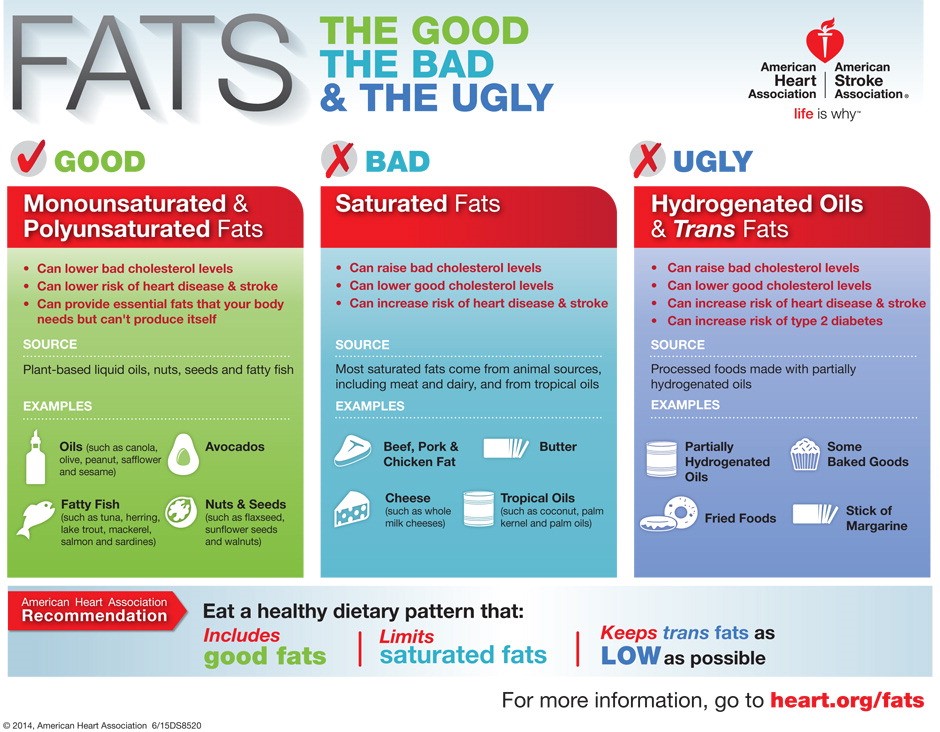New Study: Stress Cancels Out Benefits of Healthy Fats

Most people know the difference between “good fat” and “bad fat”. You take the time to be sure you are consuming mostly good fats, like avocados or Omega-3s found in fatty fish. But what if your stress level was completely eradicating the positive benefits you should be acquiring from the good fats you are eating?
In this self-proclaimed, “first study to show how stress can cancel out the benefits of eating healthier fats”, professor of psychiatry and psychology at Ohio State University in Columbus, Jan Kiecolt-Glaser, says that this study provides even more evidence that stress matters. The main takeaway point from this is that stress should be minimized whenever possible.
Benefits of Healthy Fats
According to the American Heart Association, dietary fats are essential to provide energy to your body, support cell growth, protect your organs, keep your body warm, absorb nutrients and produce important hormones. Healthy fats, called monounsaturated and polyunsaturated fats, “balance the amount of calories you eat from all foods with the amount of calories that you hurt. These foods include vegetables, fruits, and whole grains like low-fat dairy products, poultry, fish, legumes, and non-tropical vegetable oils and nuts.

The Study
Researchers focused on 60 women, 38 of whom were breast cancer survivors. The average age being 53 years old. The team wanted to examine the interaction between stress, diet and inflammatory markers that could be measured in the bloodstream.
Participants visited the university for two days, each day being randomly assigned to eat one of two breakfasts – biscuits and gravy with eggs and turkey sausage that was mostly made with saturated fat from palm oil, or an identical breakfast made primary with monounsaturated sunflower oil. To conclude the amount of stress each day, researchers used the Daily Inventory of Stressful Events questionnaire. According to the MID US National Study of Daily Experiences Inventory of Stressful Events (DISE), “The DISE is a semi-structured survey instrument, assessing a wide variety of stressors. The interview consists of a series of ‘stem’ questions asking whether certain types of events (e.g., arguments, home or work events. etc.), have occurred over the past 24 hours, along with a set of guidelines for probing affirmative responses.” The study noted stressful situations, like helping a parent with dementia who resisted help or cleaning up after a child; not “life-shattering events” but relatively stressful, according to Professor Kiecolt-Glaser.
Of the 60 women, 31 had at least one recent stressor at one of the two visited. Twenty one of the 60 women had stressful experiences before both visits, while six did not have any. After multiple blood samples were taken from the women, researchers focuses on C-reactive protein and serum amyloid A, two markers for inflammation. Results showed that women who ate the saturated fat meal had higher readings in all four negative markers, compared with the women who consumed the sunflower oil meal.
According to the study, in the women who had stressful days, this difference vanished, and as such, eating a breakfast with “bad fat” was the same as eating one with “good fat.”
Researchers concluded, “This data shows how recent stressors and a [major depressive disorder] history can reverberate through metabolic alterations, promoting inflammatory and atherogenic responses.”
How to Combat Stress
According to InVite Health’s Nutrition Director, Nicole Crane, B.S, NTP, you can combat stress by clearing stress hormones, building happy, healthy brain chemistry, vamping up daytime energy and supporting deep, restorative sleep. “When relieving stress, the goal is to balance the hormone cortisol, which is released by the adrenal glands. Stress, and the cortisol elevations that follow, have detrimental effects on all of our body systems, but take the greatest toll on the heart and the brain. One category of herbs, called adrenal adaptogens nourishes the adrenal glands and helps the body adapt to stress. They also adapt to the individual using them, offering customized benefits based on what their body requires. One herb, ashwaganda, is a classic Ayurvedic herb used for stress relief, positive mood and healthy brain function. Ashwaganda has been shown to significantly protect brain cells from the harmful oxidative effects of stress, which otherwise disrupts nerve communication, amps up inflammatory responses and causes physical damage to the brain. Research also shows that this powerful feel-good herb supports memory, relaxation and overall cognitive function by regenerating the brains nerve cells. If stress leaves you feeling exhausted, another adaptogenic herb called Rhodiola rosea (a potent Siberian herb) has been shown in a study performed in 2008 to improve stress-related fatigue, showing significant improvement in energy, mood, ability to concentrate, and mental performance in 28 days.”
The important thing is for people to find what they need to relax and unwind after a hectic day. Choosing an activity to help combat the stresses of day-to-day life is unique to each individual which is why this is not a definitive list of options. It is also important to recognise that these activities work best when used alongside a healthy and balanced diet.